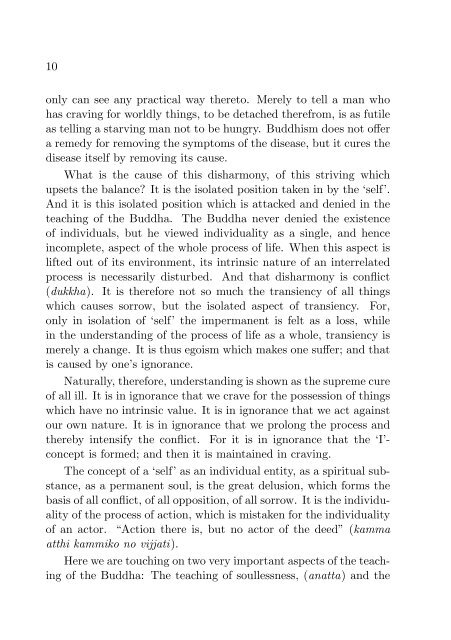Towards the Truth
Notes from a three-day debate in the 1940’s about Buddhism and Christianity.
Notes from a three-day debate in the 1940’s about Buddhism and Christianity.
Create successful ePaper yourself
Turn your PDF publications into a flip-book with our unique Google optimized e-Paper software.
10<br />
only can see any practical way <strong>the</strong>reto. Merely to tell a man who<br />
has craving for worldly things, to be detached <strong>the</strong>refrom, is as futile<br />
as telling a starving man not to be hungry. Buddhism does not offer<br />
a remedy for removing <strong>the</strong> symptoms of <strong>the</strong> disease, but it cures <strong>the</strong><br />
disease itself by removing its cause.<br />
What is <strong>the</strong> cause of this disharmony, of this striving which<br />
upsets <strong>the</strong> balance? It is <strong>the</strong> isolated position taken in by <strong>the</strong> ‘self’.<br />
And it is this isolated position which is attacked and denied in <strong>the</strong><br />
teaching of <strong>the</strong> Buddha. The Buddha never denied <strong>the</strong> existence<br />
of individuals, but he viewed individuality as a single, and hence<br />
incomplete, aspect of <strong>the</strong> whole process of life. When this aspect is<br />
lifted out of its environment, its intrinsic nature of an interrelated<br />
process is necessarily disturbed. And that disharmony is conflict<br />
(dukkha). It is <strong>the</strong>refore not so much <strong>the</strong> transiency of all things<br />
which causes sorrow, but <strong>the</strong> isolated aspect of transiency. For,<br />
only in isolation of ‘self’ <strong>the</strong> impermanent is felt as a loss, while<br />
in <strong>the</strong> understanding of <strong>the</strong> process of life as a whole, transiency is<br />
merely a change. It is thus egoism which makes one suffer; and that<br />
is caused by one’s ignorance.<br />
Naturally, <strong>the</strong>refore, understanding is shown as <strong>the</strong> supreme cure<br />
of all ill. It is in ignorance that we crave for <strong>the</strong> possession of things<br />
which have no intrinsic value. It is in ignorance that we act against<br />
our own nature. It is in ignorance that we prolong <strong>the</strong> process and<br />
<strong>the</strong>reby intensify <strong>the</strong> conflict. For it is in ignorance that <strong>the</strong> ‘I’-<br />
concept is formed; and <strong>the</strong>n it is maintained in craving.<br />
The concept of a ‘self’ as an individual entity, as a spiritual substance,<br />
as a permanent soul, is <strong>the</strong> great delusion, which forms <strong>the</strong><br />
basis of all conflict, of all opposition, of all sorrow. It is <strong>the</strong> individuality<br />
of <strong>the</strong> process of action, which is mistaken for <strong>the</strong> individuality<br />
of an actor. “Action <strong>the</strong>re is, but no actor of <strong>the</strong> deed” (kamma<br />
atthi kammiko no vijjati).<br />
Here we are touching on two very important aspects of <strong>the</strong> teaching<br />
of <strong>the</strong> Buddha: The teaching of soullessness, (anatta) and <strong>the</strong>
















